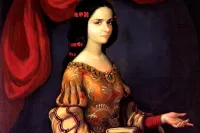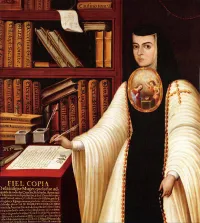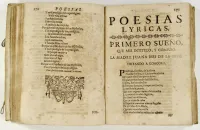Biography
1648 - 1695
"I don't study to know more, but to ignore less.”
- Sor Juana Ines de la Cruz
Early feminist Sor Juana was a 17th century poet, nun and scholar. With a remarkable aptitude for everything from Latin to geometry, she took her novitiate at the age of 16. As a nun she was free to study the more than 4000 books she collected in her cell – one of the largest private libraries in the New World. Her poetry and plays were widely read and brought her renown in Europe and Spanish America for celebrating the “magicas infusions (magical infusions)” of Native American cultures – all of which earned her a reputation as one of the greatest lyric poets of the Age. In her work as in her life, she acknowledged being “en dos partes dividida (divided in two parts),” torn between passion and reason, sensuality and religious devotion. Contemporaries gossiped about her liaisons with other nuns (and the wife of the viceroy of the Court of Mexico City), but it was her audaciously brilliant verse, and the threat to traditional authority it posed, that proved her undoing. In her most famous work Reply to Sor Filotea she defended the intellectual rights of women and condemned the Church for helping keep women uneducated. As a result of challenging societal values and ecclesiastical dogma she was officially censured. In 1694 she signed documents that may have been conscious rejections of her past life and donated many of her books to help the suffering poor in the city. She died the following year at the age of 43, while nursing her sister nuns in the midst of an epidemic. Nobel Prize winning author and poet Octavio Paz said of her poetry that it was the most important produced in the Americas until the advent of Emily Dickinson and Walt Whitman. Sor Juana – who has been pictured on Mexico’s 200-peso note – has been an inspiration and a focus of study for centuries. Her former convent is now the University of the Cloister for Sor Juana.
1648 - 1695
"I don't study to know more, but to ignore less.”
- Sor Juana Ines de la Cruz
Early feminist Sor Juana was a 17th century poet, nun and scholar. With a remarkable aptitude for everything from Latin to geometry, she took her novitiate at the age of 16. As a nun she was free to study the more than 4000 books she collected in her cell – one of the largest private libraries in the New World. Her poetry and plays were widely read and brought her renown in Europe and Spanish America for celebrating the “magicas infusions (magical infusions)” of Native American cultures – all of which earned her a reputation as one of the greatest lyric poets of the Age. In her work as in her life, she acknowledged being “en dos partes dividida (divided in two parts),” torn between passion and reason, sensuality and religious devotion. Contemporaries gossiped about her liaisons with other nuns (and the wife of the viceroy of the Court of Mexico City), but it was her audaciously brilliant verse, and the threat to traditional authority it posed, that proved her undoing. In her most famous work Reply to Sor Filotea she defended the intellectual rights of women and condemned the Church for helping keep women uneducated. As a result of challenging societal values and ecclesiastical dogma she was officially censured. In 1694 she signed documents that may have been conscious rejections of her past life and donated many of her books to help the suffering poor in the city. She died the following year at the age of 43, while nursing her sister nuns in the midst of an epidemic. Nobel Prize winning author and poet Octavio Paz said of her poetry that it was the most important produced in the Americas until the advent of Emily Dickinson and Walt Whitman. Sor Juana – who has been pictured on Mexico’s 200-peso note – has been an inspiration and a focus of study for centuries. Her former convent is now the University of the Cloister for Sor Juana.
Lesson Plan
Please login or register for an account to view this lesson plan.
Demography
Demography
Gender Female
Sexual Orientation Lesbian
Gender Identity Cisgender
Ethnicity Latinx
Faith Construct Catholic
Nations Affiliated Mexico Spain
Era/Epoch Baroque (1600-1750) Spanish Hegemony (1500-1820)
Field(s) of Contribution
Advocacy & Activism
Art, Music, Literature & Theater
Author
Education
Humanities & Religion
Music
Poet
Religion
Social Justice
Social Sciences
World History
Commemorations & Honors
Portrait Featured on Mexico’s 200 Peso Note
Her Former Convent Renamed University of the Cloister for Sor Juana
Portrait Featured on Mexico's 1000 Peso Coin (1988-1992)
Mexican Congress Wall of Honor Gold Escription (1995)
Google Doodle Commemorating de la Cruz's 366th Birthday (2017)
Demography
Gender Female
Sexual Orientation Lesbian
Gender Identity Cisgender
Ethnicity Latinx
Faith Construct Catholic
Nations Affiliated Mexico Spain
Era/Epoch Baroque (1600-1750) Spanish Hegemony (1500-1820)
Field(s) of Contribution
Advocacy & Activism
Art, Music, Literature & Theater
Author
Education
Humanities & Religion
Music
Poet
Religion
Social Justice
Social Sciences
World History
Commemorations & Honors
Portrait Featured on Mexico’s 200 Peso Note
Her Former Convent Renamed University of the Cloister for Sor Juana
Portrait Featured on Mexico's 1000 Peso Coin (1988-1992)
Mexican Congress Wall of Honor Gold Escription (1995)
Google Doodle Commemorating de la Cruz's 366th Birthday (2017)
Resources
Resources
Aldrich R. & Wotherspoon G., Who's Who in Gay and Lesbian History, from Antiquity to WWII, Routledge, London, 2001 - et al.
https://qspirit.net/sor-juana-de-la-cruz-nun-mexico/
http://msmagazine.com/blog/blog/2011/03/16/my-favorite-feminist-sor-juana-ines-de-la-cruz/
https://www.nyhistory.org/blogs/juana-ines-de-la-cruz-feminist-poet-of-new-spain
https://poets.org/poet/sor-juana-ines-de-la-cruz
https://www.poetryfoundation.org/poets/sor-juana
https://qspirit.net/sor-juana-de-la-cruz-nun-mexico/
Resources
Aldrich R. & Wotherspoon G., Who's Who in Gay and Lesbian History, from Antiquity to WWII, Routledge, London, 2001 - et al.
https://qspirit.net/sor-juana-de-la-cruz-nun-mexico/
http://msmagazine.com/blog/blog/2011/03/16/my-favorite-feminist-sor-juana-ines-de-la-cruz/
https://www.nyhistory.org/blogs/juana-ines-de-la-cruz-feminist-poet-of-new-spain
https://poets.org/poet/sor-juana-ines-de-la-cruz
https://www.poetryfoundation.org/poets/sor-juana
https://qspirit.net/sor-juana-de-la-cruz-nun-mexico/









